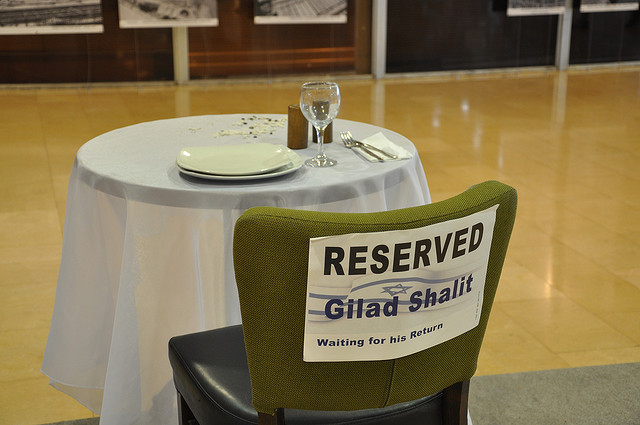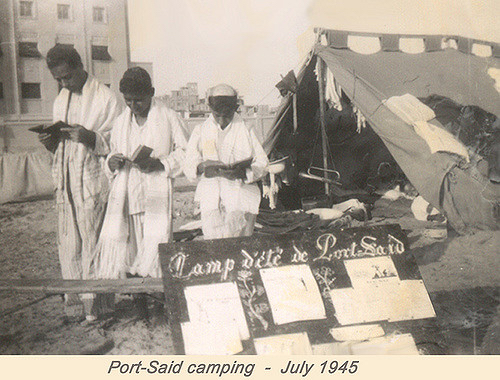There are posters in the windows, bumper stickers on the cars, pictures of the kidnapped soldier and the caption reads: “Gilad adayin chai”, in English, “Gilad still lives.” They refer to Gilad Shalit, the soldier who was taken by Hamas five years ago now.
Shalit is one issue most Israelis can rally around. His name and face are universally recognized. Mere mention of it, in or outside of Israel, causes emotions to stir. In Israel, Shalit the symbol stands for Hamas’ iniquity, its ruthlessness. Shalit the captive is a mark of shame on both the Olmert and Netanyahu governments.
Israel and Hamas trade blame for their mutual failure to broker a deal for Shalit’s release. At issue is which Palestinian prisoners would be freed in exchange for Shalit and to what extent Israel would then relieve the Gaza Strip of the siege it has been under since Hamas took over.
Shalit’s treatment does not fit the status of a prisoner of war under international law. Legally, he is a hostage, and is being held for ransom. By both legal and moral standards, he must be freed immediately and unconditionally.
But when that point is made, the response often concerns the question of Palestinian prisoners.
There are thousands of Palestinians in Israeli jails. Many of these people are criminals, others military prisoners who have been tried. Of the latter, some may well be in jail under dubious circumstances (the case of Marwan Barghouti, the well-known leader of Fatah’s Tanzim militia during the Al-Aksa Intifada is a prime example). And others are political prisoners, including several members of the Palestinian Legislative Council.
And then there are those being held under administrative detention, which means that no charge has been brought against them, no trial held and the prisoner has no recourse to a lawyer or trial. As of April 30, 2011, there were 219 Palestinians being held under administrative detention.
Some Palestinians are held for years in administrative detention. Their faces are not on well-read web sites, or shown on the evening news. Their names are not known to every reader of the New York Times, the Guardian or Le Monde. But they are held strongly in the hearts of all Palestinians.
Administrative detention is an accepted practice under international law, when there is an imminent threat strong enough to forego normal due process. But Israel uses this justification against hundreds, even thousands of Palestinians each year.
Holding Israel and the Palestinians to the same standards of law must necessarily mean recognizing the differences in their capabilities. The Palestinians, obviously, are not capable of administrative detention or most of the other procedures Israel uses to justify its imprisonment of Palestinians. By the same token, Israel legitimately arrests criminals, which Palestinians are barred from doing when the perpetrator is an Israeli.
Where Hamas holds one Israeli, Israel holds thousands of Palestinians. While Hamas’ captive is clearly a hostage, Israel has a mix of criminals, combatants held under dubious legal procedures, political prisoners and some held for reasons known only to Israeli security.
The double standard rankles many Palestinians and others whenever Gilad Shalit’s name comes up. Shalit and the Palestinian prisoners are, of course, inextricably linked because they are both stories of captives and because the hope is that the one will be exchanged eventually for some of the others.
In truth, however, these are two issues that desperately need to be separated.
A step toward realizing this was taken when the Palestinian Centre for Human Rights in Gaza joined with numerous Israeli human rights groups, as well as Amnesty International and Human Rights Watch to call for Shalit’s unconditional release. Their statement reads:
Human beings are not bargaining chips
Marking five years since the capture of Gilad Shalit, Israeli, Palestinian and international human rights organizations state:
Hamas must immediately end inhumane and illegal treatment of Gilad Shalit
Staff Sergeant Gilad Shalit has been in captivity for five years. Those holding him have refused to allow him to communicate with his family, nor have they provided information on his well-being and the conditions in which he is being held. The organizations stress that this conduct is inhumane and a violation of international humanitarian law.
Hamas authorities in Gaza must immediately end the cruel and inhuman treatment of Gilad Shalit. Until he is released, they must enable him to communicate with his family and should grant him access to the International Committee of the Red Cross.
Amnesty International & the Israel Section
B’Tselem – The Israeli Information Center for Human Rights in the Occupied Territories
Bimkom: Planners for Planning Rights
Gisha – Legal Center for Freedom of Movement
Human Rights Watch
International Federation for Human Rights
Palestinian Center for Human Rights, Gaza
Physicians for Human Rights – Israel
Public Committee Against Torture in Israel
Rabbis for Human Rights
The Association for Civil Rights in Israel
Yesh Din – Volunteers for Human Rights
This matches the extensive work all of these groups have done for years on the issue of Palestinian prisoners. Yet, despite these efforts the issue of Palestinian prisoners gets very little attention.
That’s why the Shalit issue can be frustrating to some.
But one crime can’t mitigate another. Gilad Shalit is not a prisoner of war, and Hamas does not have the right to hold him to extract concessions, justified or not, from Israel.
The ongoing efforts to mediate a deal between Israel and the Palestinians are always described as an effort to secure Shalit’s release. But where are the efforts to secure the release of Palestinians prisoners?
These need to be dual tracks, each being founded on the justice of its own cause.
If we need a pragmatic reason to separate these two issues, there is this: By tying the two together, any deal that is struck will encourage Palestinian groups to abduct more Israelis, and will encourage Israel to hold more prisoners as bargaining chips against the event of such abductions.
The issue of Palestinian prisoners needs to given much more prominence in reporting and international diplomacy. Right now, it certainly looks to every Palestinian that the life, liberty and welfare of one Israeli soldier is worth more than that of hundreds of Palestinians.
That is wrong. The answer is to resist this pairing of the two issues. Gilad Shalit’s cause is a just one; and so is that of the Palestinian prisoners, collectively, and each and every one who is unjustly imprisoned individually.
Photograph courtesy of Lilach Daniel. Published under a Creative Commons license, in collaboration with Babylon Times.






Excellent post, Mitchell.
Interestingly I also believe someone should take the first step forward toward being ‘human’, in an immoral conflict. Please see Sajepress
Mitchell, as usual, your views are eminently reasonable and your analysis incisive. Delinking Palestinian prisoners and Shalit may not be possible in the realm of realpolitik, but it makes sense at the moral, philosophical, and legal levels. As a Palestinian taxi driver said to me last week, Netanyahu doesn’t want to pay the price (in prisoner swaps) for Shalit because he does not feel sufficient political heat to do so, but both Shalit and the many Palestinian prisoners held on dubious charges (or none at all) have families who desperately await their return. Releasing these prisoners could end up humanizing the antagonists if done carefully, rather than being perceived merely, and probably falsely, as a sign of capitulation on Israel’s part or political victory on the part of Hamas.